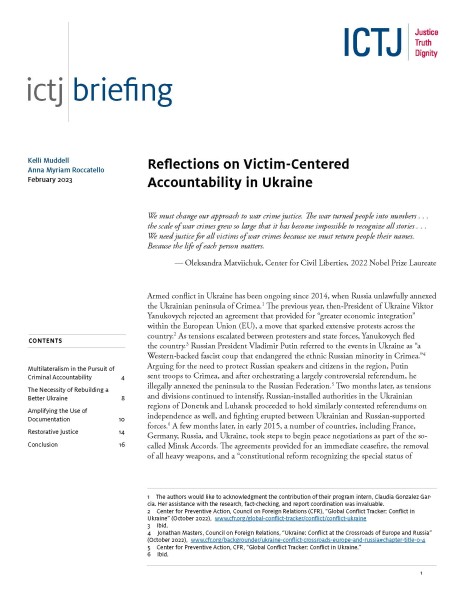We work side by side with victims to obtain acknowledgment and redress for massive human rights violations, hold those responsible to account, reform and build democratic institutions, and prevent the recurrence of violence or repression.
Reflections on Victim-Centered Accountability in Ukraine
This briefing paper examines the various actions that Ukrainian officials and members of the international community have launched to investigate and prosecute war crimes and other human rights violations committed in Ukraine since Russia invaded the country in February 2022. It explores the myriad challenges they face and how tools from transitional justice can be applied in tandem to deliver justice and reparation to victims and lay the foundation for a more inclusive and democratic Ukraine.

Since Russian invaded Ukraine in late February 2022, the world has witnessed innumerable war crimes and other human rights violations, including indiscriminate attacks against civilians, summary executions, torture and ill-treatment, sexual and gender-based violence (SGBV), unlawful detentions, and forced deportation.
In response, officials in Ukraine and members of the international community have launched multiple—and unprecedently expansive—efforts to investigate and prosecute these atrocities. Most, however, narrowly focus on criminal prosecution and often overlook the immediate needs and perspectives of victims.
This paper examines the various actions that have been taken or are under consideration to investigate and prosecute war crimes and other human rights violations in Ukraine. It explores the myriad challenges they face and how tools from the field of transitional justice can be applied in tandem to deliver justice and reparation to victims and lay the foundation for a more inclusive and democratic Ukraine.
The paper makes the case that criminal accountability is but one dimension of justice. For Ukrainians most acutely affected by the war, such as victims of torture and SGBV, as well as broad sectors of the civilian population whose lives have been upended and who now find themselves in desperate need, justice in fact entails a number of remedies including humanitarian assistance based on acknowledgment and repair.
The authors further argue that the ongoing initiatives to investigate crimes committed in the war offer an opportunity. Specifically, the vast amount of documentation that government, civil society, and international actors have been gathering for use as evidence in criminal proceedings can be harnessed to advance other justice-related objectives. For instance, this information could serve a truth-seeking process that aims to establish a victim-centered historical record of the war and could inform the design of a more coordinated and forward-looking assistance program, including a much-needed reparations program.

